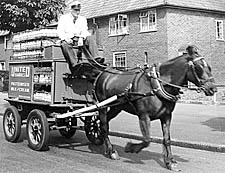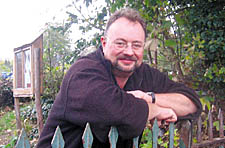|
|
 |
| |

Horsing around: A milkman clip-clops on his rounds

Mick Rand |
Manure you can't ignore it
In the first of a monthly gardening
column, Mick Rand says good manure is easy to find – and
is great for your garden.
IN those bygone days of yesteryear, when the inhabitants
of this island chewed blissfully on Hovis – not knowing
the future was focaccia – doorstep milk deliveries were
made by horse and cart.
And as the merry milkman clip-clopped his one-horsepower
way about the invariably cobbled streets he’d always be
followed in his daily round by a glum urchin clutching a bucket
and shovel.
Pity the poor child – sent out by enthusiastic gardening
parents – who’s job it was to follow the horse, waiting
for it to digest its breakfast and produce manure which would
be used to fertilise their rose bushes.
In manuring your garden you’re achieving two things at
once. Firstly, feeding your plants. Quality, well-rotted horse
manure contains the three major plant nutrients in roughly the
following proportions: Nitrogen 0.7 per cent; Phosphorus 0.3
per cent; and Potassium 0.6 per cent.
Nitrogen is particularly important here as it’s readily
leached out of the soil by rainfall. The other two are scarcely
less essential and in all three cases, nutrients supplied in
the form of well-decayed, natural stuff, are readily absorbed
by growing plants.
Second, as well as feeding your plants you’re feeding the
soil itself. The humus (ie: organic carbon) content of manure
or compost etc. is crucial for a whole array of interacting
physical and biological soil processes, many carried out on
the gardener’s behalf by armies of animals, from moles
to worms to microbes, ensuring long-term fertility, as well
as good water retention over dry spells.
No sensible grower can afford to ignore manure but without the
milkman’s horse, how do we do it when we do doo-doo it
these days?
If you’re feeling flush, there’s still a thriving
manure trade to meet your needs. Thompsons of Crews Hill (phone
orders preferred: 020 8363 1383) are big players in north London.
Their ‘Heavy Horse’ goes for £2.50 per 70 litre
sack, easy and convenient to move about, or else £30 per
cubic metre loose or £35 in a bag.
Cheaper therefore by the cubic metre but requiring much more
handling. You’ll most likely have to shovel it all twice.
Heavy Horse is ‘ready to go’, having already been
stacked and turned for at least a year, sufficiently rotted
to pile straight into your soil.
But if the bottom has dropped out of your finances, fear not,
you don’t have to go too far to get some, from one of our
city farms, free of charge although a small donation probably
wouldn’t go amiss.
College Farm (Fitzalan Road N3, 020 8349 0690); Kentish Town
City Farm (Cressfield Close NW5 (NB parking in Grafton Road
only), 020 7916 5421); and Freightliners City Farm (Sheringham
Road N7, 020 7609 0467) are all excellent sources, though you’ll
have to bring your own tools and sacks and shovel and bag it
yourself.
City farm manure can be quite as good as the bought stuff, but
may at times be fresher. If so, you should by no means look
such a gift horse in the opposite end to its mouth.
Bung anything a bit fresh in with your normal composting material,
which it will bulk out considerably, and compost it yourself.
Winter is the best time for manuring, if for no simpler reason
than there are fewer plants around, compared with the warmer
months, to get in the way as you sling the stuff about. Scatter
your manure over the soil fairly evenly, and, if so moved, roughly
fork it in to half a tine’s depth.
Those moles, worms, microbes and the like will do the rest of
the digging for you over the coming months.
They are no bother at all – and what’s more, they’ll
never pester you for pocket money!
|
 |
|
| |
|
 |
|



